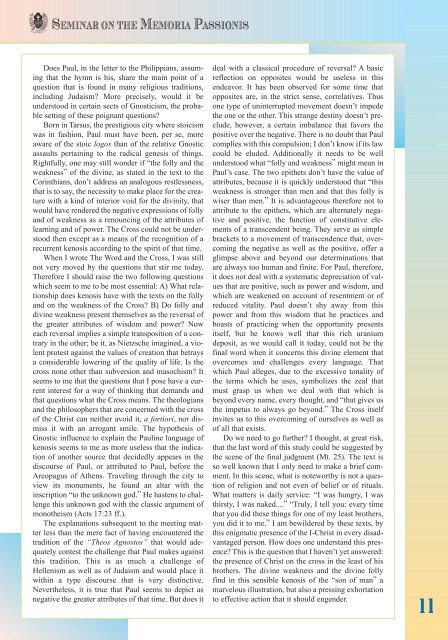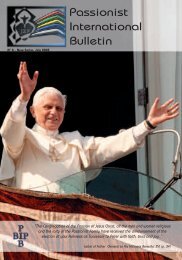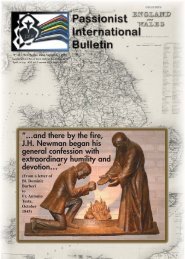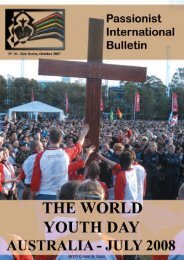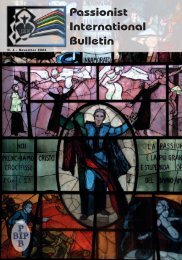Passionist International Bulletin
Passionist International Bulletin
Passionist International Bulletin
You also want an ePaper? Increase the reach of your titles
YUMPU automatically turns print PDFs into web optimized ePapers that Google loves.
seminar on the memoria passionisDoes Paul, in the letter to the Philippians, assumingthat the hymn is his, share the main point of aquestion that is found in many religious traditions,including Judaism? More precisely, would it beunderstood in certain sects of Gnosticism, the probablesetting of these poignant questions?Born in Tarsus, the prestigious city where stoicismwas in fashion, Paul must have been, per se, moreaware of the stoic logos than of the relative Gnosticassaults pertaining to the radical genesis of things.Rightfully, one may still wonder if “the folly and theweakness” of the divine, as stated in the text to theCorinthians, don’t address an analogous restlessness,that is to say, the necessity to make place for the creaturewith a kind of interior void for the divinity, thatwould have rendered the negative expressions of follyand of weakness as a renouncing of the attributes oflearning and of power. The Cross could not be understoodthen except as a means of the recognition of arecurrent kenosis according to the spirit of that time.When I wrote The Word and the Cross, I was stillnot very moved by the questions that stir me today.Therefore I should raise the two following questionswhich seem to me to be most essential: A) What relationshipdoes kenosis have with the texts on the follyand on the weakness of the Cross? B) Do folly anddivine weakness present themselves as the reversal ofthe greater attributes of wisdom and power? Noweach reversal implies a simple transposition of a contraryin the other; be it, as Nietzsche imagined, a violentprotest against the values of creation that betraysa considerable lowering of the quality of life. Is thecross none other than subversion and masochism? Itseems to me that the questions that I pose have a currentinterest for a way of thinking that demands andthat questions what the Cross means. The theologiansand the philosophers that are concerned with the crossof the Christ can neither avoid it, a fortiori, nor dismissit with an arrogant smile. The hypothesis ofGnostic influence to explain the Pauline language ofkenosis seems to me as more useless that the indicationof another source that decidedly appears in thediscourse of Paul, or attributed to Paul, before theAreopagus of Athens. Traveling through the city toview its monuments, he found an altar with theinscription “to the unknown god.” He hastens to challengethis unknown god with the classic argument ofmonotheism (Acts 17:23 ff.).The explanations subsequent to the meeting matterless than the mere fact of having encountered thetradition of the “Theos Agnostos” that would adequatelycontest the challenge that Paul makes againstthis tradition. This is as much a challenge ofHellenism as well as of Judaism and would place itwithin a type discourse that is very distinctive.Nevertheless, it is true that Paul seems to depict asnegative the greater attributes of that time. But does itdeal with a classical procedure of reversal? A basicreflection on opposites would be useless in thisendeavor. It has been observed for some time thatopposites are, in the strict sense, correlatives. Thusone type of uninterrupted movement doesn’t impedethe one or the other. This strange destiny doesn’t preclude,however, a certain imbalance that favors thepositive over the negative. There is no doubt that Paulcomplies with this compulsion; I don’t know if its lawcould be eluded. Additionally it needs to be wellunderstood what “folly and weakness” might mean inPaul’s case. The two epithets don’t have the value ofattributes, because it is quickly understood that “thisweakness is stronger than men and that this folly iswiser than men.” It is advantageous therefore not toattribute to the epithets, which are alternately negativeand positive, the function of constitutive elementsof a transcendent being. They serve as simplebrackets to a movement of transcendence that, overcomingthe negative as well as the positive, offer aglimpse above and beyond our determinations thatare always too human and finite. For Paul, therefore,it does not deal with a systematic depreciation of valuesthat are positive, such as power and wisdom, andwhich are weakened on account of resentment or ofreduced vitality. Paul doesn’t shy away from thispower and from this wisdom that he practices andboasts of practicing when the opportunity presentsitself, but he knows well that this rich uraniumdeposit, as we would call it today, could not be thefinal word when it concerns this divine element thatovercomes and challenges every language. Thatwhich Paul alleges, due to the excessive tonality ofthe terms which he uses, symbolizes the zeal thatmust grasp us when we deal with that which isbeyond every name, every thought, and “that gives usthe impetus to always go beyond.” The Cross itselfinvites us to this overcoming of ourselves as well asof all that exists.Do we need to go further? I thought, at great risk,that the last word of this study could be suggested bythe scene of the final judgment (Mt. 25). The text isso well known that I only need to make a brief comment.In this scene, what is noteworthy is not a questionof religion and not even of belief or of rituals.What matters is daily service: “I was hungry, I wasthirsty, I was naked....” “Truly, I tell you: every timethat you did these things for one of my least brothers,you did it to me.” I am bewildered by these texts, bythis enigmatic presence of the I-Christ in every disadvantagedperson. How does one understand this presence?This is the question that I haven’t yet answered:the presence of Christ on the cross in the least of hisbrothers. The divine weakness and the divine follyfind in this sensible kenosis of the “son of man” amarvelous illustration, but also a pressing exhortationto effective action that it should engender.11


